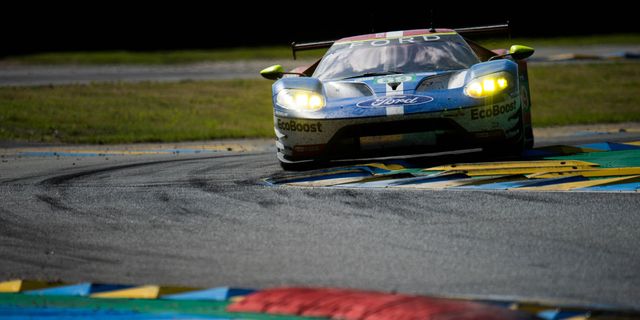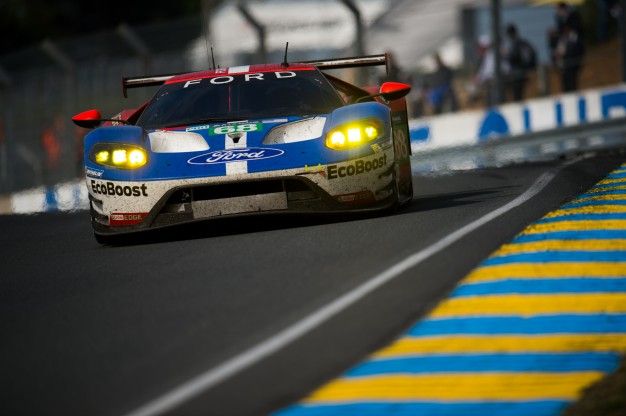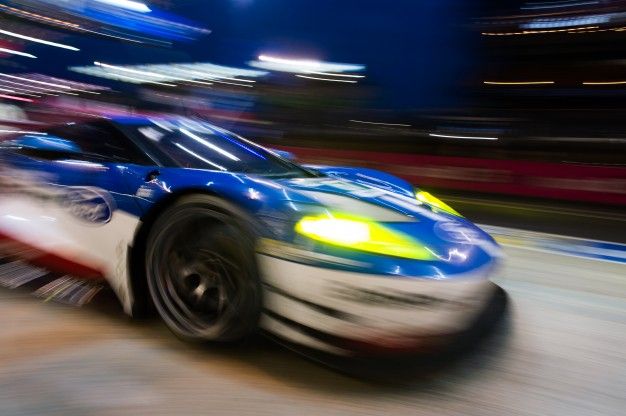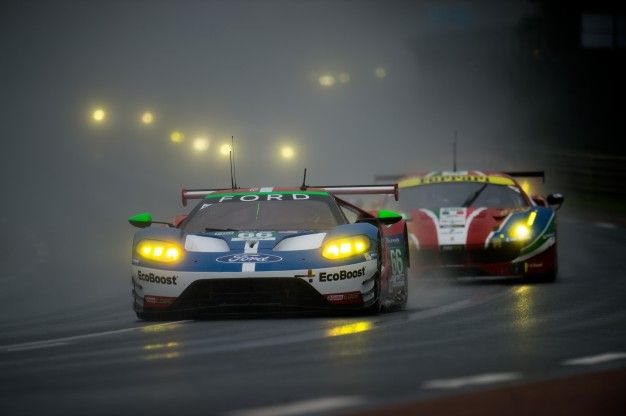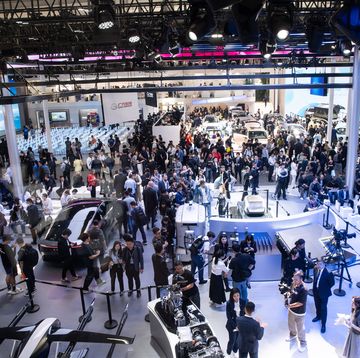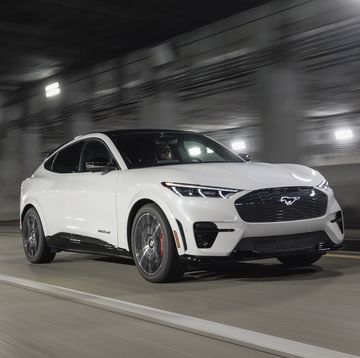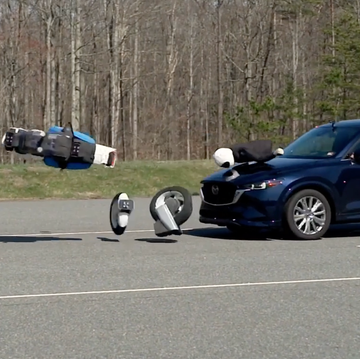What a difference a day—and 2890 miles—makes. After the first hour at this year’s Le Mans 24 Hours, it looked as if Ford’s expensive return to the world’s most famous endurance race, timed to coincide with the 50th anniversary of the brand’s first overall victory, was set to unravel in dramatic fashion in front of 263,500 fans.
Before the race even began, the #67 GT had been pushed off the grid and back to its garage with a gearbox fault. It was eventually fixed but with a delay that took it out of contention for class honors. Torrential rain meant the race began behind a trio of safety cars, and when these were eventually called in 52 minutes later, the remaining three Fords looked to be off the pace.
It took just four minutes for the #66 GT that was running second in class to be passed by the #51 Ferrari 458. The leading GT, #68, soon proved equally powerless to keep the Ferrari at bay, and before long both they and the Ferraris were overwhelmed by the flying Porsche Motorsport 911 RSRs, which proved to be particularly happy in the damp conditions.
The grins that had been worn by the senior executives in Ford’s corporate hospitality unit faded. Although this is Ford’s first year in the World Endurance Championship, we were in no doubt that Le Mans was the primary target. “It’s optimized not just for the class but for here; it was designed for this track,” Raj Nair, Ford’s chief technical officer, told us before the race began, also admitting that it would have made more sense for the GT to make its debut a year earlier, to gain experience for the bid to win on the 50th anniversary of the GT40’s first victory. “To be honest, we had some false starts. We had a window there that could have allowed us to run in ’15, put the car out, and then really make the run in 2016 for the 50th anniversary. But we didn’t get the program approved in time.”
Yet against early expectations, the GTs came back to stage a return that took Ford to a victory that was both emotional and deserved, with the 2016 race becoming one of the closest and most exciting in the 84-year history of the event. While Toyota’s remarkable failure to win with three minutes left handed Porsche the overall victory—the brand’s 18th at La Sarthe—until the very end of the race almost as much attention was being paid to the battle further down the order between Ford and Ferrari in GTE Pro.
As Porsche’s early challenge faded and it became clear that Aston Martin’s and Chevrolet’s GTE Pro cars were well off the pace (see our previous post on the controversy surrounding various “Balance of Performance” adjustments), so the race did indeed become another Ford/Ferrari duel in the mold of the classics of the 1960s, albeit one where Ford developed a strong numerical advantage. The #71 and #51 AF Corsa works Ferrari 488s dropped out after 143 and 179 laps respectively, the latter with a spectacular engine failure. By evening, Italy’s honor was being upheld by just the privateer #82 Risi Competizione 488, which surrendered its class lead at 7:30 p.m. to the #68 GT.
Yet the pack of Fords didn’t have the remaining 20 hours of the race to themselves, with the #82 Ferrari fighting a remarkable rearguard action that saw the lead change several times. By 8:30 in the morning, the Ferrari led the #68 car by just 13 seconds, with the gap increased to more than a minute as the GT was called in for a pit-lane penalty for a refueling infringement.
But it didn’t last. Ford increased the pace and took the class lead with under three hours to go, the #68 car’s margin increasing as the Ferrari suffered an unforced spin. For the final stint, former Formula 1 driver Giancarlo Fisichella took over in the 488 and managed to fend off the chasing #69 GT, denying Ford a 1-2 finish but allowing it to finish the race at first, third, and fourth in the GTE Pro class, with German Dirk Muller getting the honor of driving the victory. Even the #67 car was patched up to make it to the end of the race, albeit 78 laps behind the leaders.
- Performance Balancing Issue Overtakes the Paddock on the Eve of the 2016 Le Mans 24 Hours
- Interview: Ford GT Driver Marino Franchitti on Le Mans, Rain, and History
- 2016 24 Hours of Le Mans: Toyota Reliability Vanishes at Worst Possible Moment
So was it worth it? The 2016 Le Mans is destined to be remembered as the race that Toyota lost in spectacular fashion, but it’s also one that effectively justified Ford’s decision to sign off on the significant development budget for both the GTE racer and its roadgoing sibling. We’re looking forward to seeing how that version builds on this momentum.
Our man on the other side of the pond, Mike Duff lives in Britain but reports from across Europe, sometimes beyond. He has previously held staff roles on U.K. titles including CAR, Autocar, and evo, but his own automotive tastes tend toward the Germanic: he owns both a troublesome 987-generation Porsche Cayman S and a Mercedes 190E 2.5-16.
